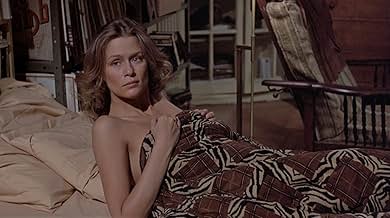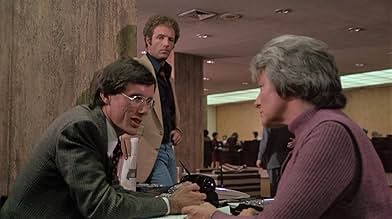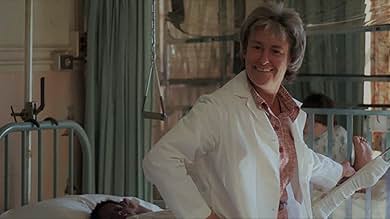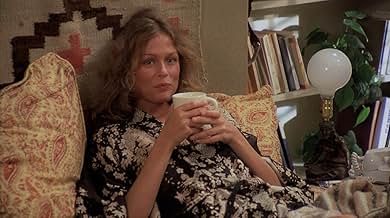IMDb-BEWERTUNG
7,1/10
6964
IHRE BEWERTUNG
James Caan verkörpert einen süchtigen Glücksspieler, der weder aufhören noch gewinnen kann. Er schuldet der Mafia $40.000, aber liebt den Nervenkitzel, sein Glück herauszufordern.James Caan verkörpert einen süchtigen Glücksspieler, der weder aufhören noch gewinnen kann. Er schuldet der Mafia $40.000, aber liebt den Nervenkitzel, sein Glück herauszufordern.James Caan verkörpert einen süchtigen Glücksspieler, der weder aufhören noch gewinnen kann. Er schuldet der Mafia $40.000, aber liebt den Nervenkitzel, sein Glück herauszufordern.
- Auszeichnungen
- 1 Nominierung insgesamt
Empfohlene Bewertungen
This is a film that must be seen to be believed.
Caan is extraordinary; the emotional truth of this film penetrates each line, each scene...The most searing and intense and exact ending in modern film. The straight-forward telling of a professor with a gambling problem does not prepare one for the scale and price of betrayal and redemption of human emtions that are portrayed. A stunning film.
Caan is extraordinary; the emotional truth of this film penetrates each line, each scene...The most searing and intense and exact ending in modern film. The straight-forward telling of a professor with a gambling problem does not prepare one for the scale and price of betrayal and redemption of human emtions that are portrayed. A stunning film.
In pop culture, before you had to "know when to walk away, know when to run," THE GAMBLER was synonymous with a Fyodor Dostoevsky novel and transcended into this 1970's film written by James Toback, directed by Karel Reisz and starring James Caan as university professor Axel Freed...
But Axel's real story isn't his job, but his vice, practically a religion: that of gutsy yet brainless gambling...
An addiction making him the user/loser of other people's money, including his own mother (more of a flirtatious step sister). But, while it's great seeing Caan facing the dark side of human nature, there's a lot to be desired when, for instance, he gets in over his head... and then some...
Shady characters come and go and sometimes return, ranging from Burt Young to Paul Sorvino, but their threats aren't all that... threatening. And while each performance is fitfully capable, it's as if the bookies, along with the audience, are passive observers to Axel's reckless and often ridiculous impulses.
Scenes with an extremely patient girlfriend/ingenue Lauren Hutton are overlong and distracting; her part feels tacked-on, mostly. And inside the classroom, as lecturer, Caan doesn't seem completely legit; he pulls off the roguish gambling addict better than a member of such a prestigious academia (plus he's an author), looking more like a tough guy football coach doubling as teacher...
Meanwhile, sporadic and strategic illegal backroom gambling sequences (filled with mafioso-looking inhabitants) lack the kind of severely desperate tension that these grungy locations aesthetically promise...
With so much to lose in each hand or roll of the dice or turn of the wheel, we should be biting our nails, and so should he... although a quick trip to Las Vegas does up the ante, injecting a needed dose of existential suspense into the otherwise languid visual prose.
Overall, Caan's steely reactions to the bottom continuously falling out are a standout... albeit kind of a shame since he often slips out of trouble faster than it takes to maintain an edgy pulse throughout; it's like watching a diver swim with toothless sharks...
And yet, if you're a fan of the infectiously likeable square-jawed actor (a perfectly equal hybrid of cult and mainstream cinema) this is definitely an intriguing two-hour melodrama that actually gets better with each viewing. What initially seems rather mundane becomes a voyeuristic character-study with subtle yet calculating finesse...
And given the ensemble-friendly era, there are a host of recognizable actors like one perturbed bookie, Jimmy, played by Carmine Caridi (who Francis Ford Coppola originally had in mind for what became Caan's game-changing role as Sonny Corleone in THE GODFATHER: then switched to a killer cameo in the sequel): He rules a memorable scene providing a deeper glimpse into Axel's addiction, and what might be the consequences...
Then there are future TV-fixtures Antonio Fargas, Lawrence Hilton-Jacobs, Stuart Margolin and Vic Tayback. M. Emmett Walsh also turns up and as a weenie banker is another James... Woods...
Specifically, when playing on cable, Time Warner Cable's top-of-the-screen index description states very simply: "James Caan in a study in self-destruction." And, well... that's pretty much that...
What sets out to be a proverbial X-ray of the soul winds up merely exposing bones. Then again, THE GAMBLER leaves most of the fleshing-out for an impartial and ambiguous audience. Which isn't so bad either.
But Axel's real story isn't his job, but his vice, practically a religion: that of gutsy yet brainless gambling...
An addiction making him the user/loser of other people's money, including his own mother (more of a flirtatious step sister). But, while it's great seeing Caan facing the dark side of human nature, there's a lot to be desired when, for instance, he gets in over his head... and then some...
Shady characters come and go and sometimes return, ranging from Burt Young to Paul Sorvino, but their threats aren't all that... threatening. And while each performance is fitfully capable, it's as if the bookies, along with the audience, are passive observers to Axel's reckless and often ridiculous impulses.
Scenes with an extremely patient girlfriend/ingenue Lauren Hutton are overlong and distracting; her part feels tacked-on, mostly. And inside the classroom, as lecturer, Caan doesn't seem completely legit; he pulls off the roguish gambling addict better than a member of such a prestigious academia (plus he's an author), looking more like a tough guy football coach doubling as teacher...
Meanwhile, sporadic and strategic illegal backroom gambling sequences (filled with mafioso-looking inhabitants) lack the kind of severely desperate tension that these grungy locations aesthetically promise...
With so much to lose in each hand or roll of the dice or turn of the wheel, we should be biting our nails, and so should he... although a quick trip to Las Vegas does up the ante, injecting a needed dose of existential suspense into the otherwise languid visual prose.
Overall, Caan's steely reactions to the bottom continuously falling out are a standout... albeit kind of a shame since he often slips out of trouble faster than it takes to maintain an edgy pulse throughout; it's like watching a diver swim with toothless sharks...
And yet, if you're a fan of the infectiously likeable square-jawed actor (a perfectly equal hybrid of cult and mainstream cinema) this is definitely an intriguing two-hour melodrama that actually gets better with each viewing. What initially seems rather mundane becomes a voyeuristic character-study with subtle yet calculating finesse...
And given the ensemble-friendly era, there are a host of recognizable actors like one perturbed bookie, Jimmy, played by Carmine Caridi (who Francis Ford Coppola originally had in mind for what became Caan's game-changing role as Sonny Corleone in THE GODFATHER: then switched to a killer cameo in the sequel): He rules a memorable scene providing a deeper glimpse into Axel's addiction, and what might be the consequences...
Then there are future TV-fixtures Antonio Fargas, Lawrence Hilton-Jacobs, Stuart Margolin and Vic Tayback. M. Emmett Walsh also turns up and as a weenie banker is another James... Woods...
Specifically, when playing on cable, Time Warner Cable's top-of-the-screen index description states very simply: "James Caan in a study in self-destruction." And, well... that's pretty much that...
What sets out to be a proverbial X-ray of the soul winds up merely exposing bones. Then again, THE GAMBLER leaves most of the fleshing-out for an impartial and ambiguous audience. Which isn't so bad either.
From the first scene to the last I was on the edge of my seat. Bet after bet my stomach turned. Caan's Axel Freed is driven to hit the big one, but it never seems to come or be enough. He loves the thrill of losing and feels safe when he is at the bottom.
Watching Freed bet tens of thousands of dollars on whims is excruciating. This film is one huge car wreck that you can't turn away from. With each scene the damage gets worse and worse.
"If all my bets were safe they just wouldn't have any juice," he tells his bookie.
Axel is never happy--even when he is doing the thing he enjoys most. You can see the underlying dissatisfaction he has with his job, his life, and the universe in general. The only constant in his existence is the bet. Win or lose.
Freed is very adept at evading the lowlifes he owes his shirt to. It is a joyride for him to constantly "dodge the bullet". That is why each bet becomes riskier and riskier. He wants to see what will happen to him when all of his luck runs out.
At one point in the film Axel reads a passage from an essay on George Washington to his class. He and his students conclude that Washington was afraid of failure and that he tried to remove the element of risk from everything he did. It is the very antithesis of Axel's life as a gambler. He creates situations that are totally immersed in risk believing that it is the only way to ensure true success. All or nothing. He is willing to compromise not only himself, but anyone around him who cares about him. By displaying his dark, self-destructive side he gambles with their feelings and challenges them to either love him or leave him.
It was a special treat to see two actors (Cann and Sorvino) who are in two of the best crime movies ever made (The Godfather and Goodfellas) together in the same film.
Also Antonio Vargas is appropriately slimy as the Pimp (sort of an R-rated Huggy Bear).
There are some pivotal moments in the film like when Axel is told that he must get one of his basketball-playing students to fix a game; or when he confronts his millionaire grandfather after learning that he refused to cover his debt.
I won't give away the ending, but the payoff is not what you would expect in American cinema.
Watching Freed bet tens of thousands of dollars on whims is excruciating. This film is one huge car wreck that you can't turn away from. With each scene the damage gets worse and worse.
"If all my bets were safe they just wouldn't have any juice," he tells his bookie.
Axel is never happy--even when he is doing the thing he enjoys most. You can see the underlying dissatisfaction he has with his job, his life, and the universe in general. The only constant in his existence is the bet. Win or lose.
Freed is very adept at evading the lowlifes he owes his shirt to. It is a joyride for him to constantly "dodge the bullet". That is why each bet becomes riskier and riskier. He wants to see what will happen to him when all of his luck runs out.
At one point in the film Axel reads a passage from an essay on George Washington to his class. He and his students conclude that Washington was afraid of failure and that he tried to remove the element of risk from everything he did. It is the very antithesis of Axel's life as a gambler. He creates situations that are totally immersed in risk believing that it is the only way to ensure true success. All or nothing. He is willing to compromise not only himself, but anyone around him who cares about him. By displaying his dark, self-destructive side he gambles with their feelings and challenges them to either love him or leave him.
It was a special treat to see two actors (Cann and Sorvino) who are in two of the best crime movies ever made (The Godfather and Goodfellas) together in the same film.
Also Antonio Vargas is appropriately slimy as the Pimp (sort of an R-rated Huggy Bear).
There are some pivotal moments in the film like when Axel is told that he must get one of his basketball-playing students to fix a game; or when he confronts his millionaire grandfather after learning that he refused to cover his debt.
I won't give away the ending, but the payoff is not what you would expect in American cinema.
I saw this movie back in 1974/75 when it was released. I was already a Caan man. My comments are just random tidbits. Burt Young would go on to join Caan in 1975's The Killer Elite". Monkey (London Lee) was a stand-up comic who appeared numerous times on the Ed Sullivan show in the 60's. Lauren Hutton would trade Caan for Burt Reynolds in Gator. Caan earlier had beat out Burt for the role of Sonny Corleone. The line I remember most from this film is when Axel's mother is trying to get a bank loan to fund his gambling debt. There are some bureaucratic snafus and the bank officer isn't sure he has the proof to approve the loan to mom. Caan says "I came out of her womb and I know she's my mom. Now give her the god... money!".
7sol-
A gritty, realistic film about addiction, it has a bit of haunting atmosphere to it, and although awfully dreary and a touch too harrowing for its own good, the film still packs a punch. Caan has a very interesting character, one who understands his own addiction yet still deceives himself, and he gives off a very solid performance, even though his character does come off rather cold and a bit hard to relate to. What the film shows us and what happens is quite predictable, but that does not prevent it from still having potency, and the ending certainly is not predictable, and is actually rather fascinating. The film's music score fits the project perfectly, and the driving sequences depict the character's feelings very well. Certainly this worth checking out, even if it is no cinema masterpiece.
Wusstest du schon
- WissenswertesAccording to James Toback, before his screenplay was accepted at Paramount Pictures, and was making the rounds with actors, Peter Boyle was first interested in playing the lead. Robert De Niro lobbied hard for the role, to the point where De Niro started to dress like the writer. Toback pressured director Karel Reisz to meet with De Niro. After meeting him, Reisz said that he would not, and could not consider De Niro for the role, and if Toback kept insisting, he would not be allowed to collaborate on the film further.
- PatzerAxel knocks the pimp's hat off on the second punch. It reappears on his head on the following one.
- VerbindungenFeatured in WatchMojo: Top 10 Gambling Movies (2014)
- SoundtracksSymphony No. 1 in D
Written by Gustav Mahler (as Mahler)
Performed by Koninklijk Concertgebouworkest (as The Concertgebouw Orchestra)
Conducted by Bernard Haitink (as Haitink)
Courtesy of Philips Records
Top-Auswahl
Melde dich zum Bewerten an und greife auf die Watchlist für personalisierte Empfehlungen zu.
- How long is The Gambler?Powered by Alexa
Details
Box Office
- Bruttoertrag in den USA und Kanada
- 1.305.782 $
- Laufzeit
- 1 Std. 51 Min.(111 min)
- Sound-Mix
- Seitenverhältnis
- 1.85 : 1
Zu dieser Seite beitragen
Bearbeitung vorschlagen oder fehlenden Inhalt hinzufügen



































